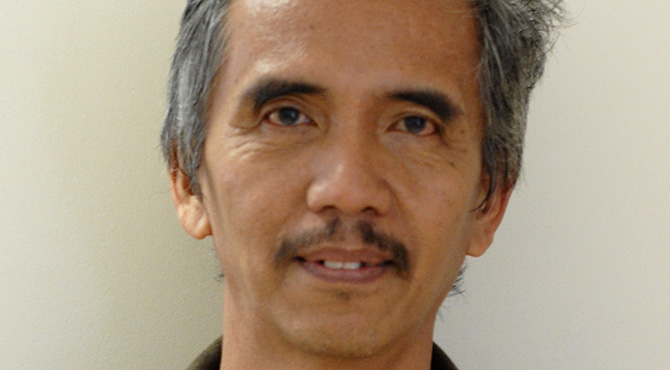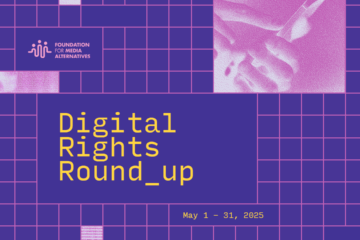The one and only Obet
A tribute to Roberto ‘Obet” Verzola, written by Nina Somera, a member of FMA’s Board of Trustees.

(Photo taken from Oxford Internet Institute)
Last night, the rains brought a respite from the humid summer heat. Its unexpectedness was a distraction from the surreality of ABSCBN’s shutdown and other unabated abuses of the Duterte administration regardless of the pandemic. Little did we know that a few hours before, a gentle and courageous soul was taken from this earth. Roberto Verzola passed away.
As somebody who survived torture during Martial Law, the immaturity of democracy, the corporatisation of natural resources and the return of tyranny, could it be that his heart could not take the madness around him any longer?
I first met sir Obet in August 1998 when I was writing an article on “intellectual property” rights, which became one of the buzzwords with the emergence of the World Trade Organisation. I was a bit hesitant to have another conversation over a topic that was becoming too technical and legalistic based on the materials which I had. Yet I was encouraged by a colleague in the Philippine Collegian about sir Obet’s humility despite being a genius. The unassuming voice over the phone soon agreed to have a conversation with me in his house along Anonas Extension but requested to have it at 8 am. I am not sure if I had to cut a class to meet him but I remember sir Obet explaining that his mind is fresh in the morning.
Boy was he right. He walked me through the period before and after the General Agreements on Tariffs and Trade (GATT). He explained the necessary and evolving role of piracy in the various stages of underdevelopment and development and more importantly, the transition in between. He made the link between and among economies and their primary means of production and products. For him, one’s access to critical information is an indicator of the quality of one’s access to citizenship.
Months later, I bumped into him during a rally of indigenous peoples and farmers in front of the Department of Environment and Natural Resources (DENR). While I was searching for somebody from LRC among the crowd, I was hearing a familiar voice from the megaphone. Indeed it was sir Obet. The engineer was also an environmentalist.
The year 1998 was a busy one for activists. Apart from the immediate aftermath of the WTO, the Philippines saw developments, contradictions and mobilisations around the Intellectual Property Code, the Indigenous Peoples’ Rights Act, the Mining Act (which in turn undermined IPRA), Clean Air Act and so on. I would have some more conversations with sir Obet on different occasions until he gave me a stack of the Philippine Greens’ booklets (titled “Ecology, Technology and Social Change”). Later he mentioned that he thought that I could organise a Philippine Green chapter in UP. I just kept quiet, instead of explaining that I was living a less “activist” life after Philippine Collegian.
It took several years before I realised that the off-campus interlocutor I always looked forward meeting was a giant in social movements. I was already a staff of the Foundation for Media Alternatives when I learned that sir Obet was actually the father of Philippine e-mail. He made Green Net, a non-profit internet service provider available to local non-government organisations and surfaced the public interest perspective of internet governance, universal access and so on. As a scientist for the people, he knew what was possible in tools and systems. Hence he always fought for what must belong to the public domain of knowledge, information and other resources.
No wonder he was among the leading advocates of free and open source software. He was also among those who analysed the results of the first automated elections in the country. In one of the biggest FOSS fares in the mid-2000s, sir Obet was invited to present a civil society perspective. He was also requested not to bring up issues around the elections because one of the event organisers belonged to the other side of the fence. Moreover, it was felt that the topic itself required its own space among technologists. I cannot remember anymore exactly what was asked from him, but he presented his framework around the information societies where FOSS is just a teeny tiny part of it. And he made a slight potshot about the 2004 elections.
But that is sir Obet. He may be the gentlest and humblest creature around but he was unstoppable whenever he sensed that democracy and human rights are at stake, much less whenever he decoded potential and actual abuse of power through a combination of actual conversations and computations. For power comes in different forms that sites of struggle are necessarily interrelated. It is also for this reason that it becomes incumbent for activists to embrace multiple identities in perusing and shaping histories as they unfold.
So it is not surprising that his life story has countless but connected strands, defined by generosity and integrity. With sir Obet’s intellect, talent, attitude and authenticity, he could have been one of the highest paid professionals in the corporate world. But he shunned affluence and instead extended his resources where it is needed. For years, he asked me to call him Obet or at least Kuya Obet until he got tired. I failed him on several occasions. For one, I did not manage to set up a UP chapter of Philippine Greens (I also don’t know why I did not say no right from the start). He agreed to be a subject of a biographical essay for a creative non-fiction class, but I failed to write it (and I still have the tape of our conversation). He advised me not to fuzz about security and just start farming even in a nondescript place. I still can’t do it. I am not sure if he took these against me because I cannot recall him ever saying no to any request or advice thereafter (Indeed, guilt hounds me).
Perhaps the last lesson that I drew from sir Obet was about integrity. Our last conversation dwelled on social movements in the Philippines, his bottom lines in alliance-building, his increasing investment in clean energy, including partnership with local governments and so on. Interestingly, in the same conversation, he helped me piece together something that bothered me then and decide to drop everything and move elsewhere. Like power, something that I had and that was so coveted by others, may turn out to be shitty after all.
There was lightness too. Although sir Obet lamented that his illness prevented him to be more involved in CREST, he was overjoyed with the little perks. His cane became a ticket to a First Class upgrade in an airline. After trying to convince him to have a surgery as a preventive measure, he did not budge. Citing the figures from his previous tests, he wanted to have another test after a few more months of being on a certain diet. As a scientist, he said he had to be consistent with his experiment. I just rolled my eyes with a lot of hope.
Last night, the rains fell on the scorched earth. The latter likely cried in gratitude and wailed in pain, surrendering one of the rare North Stars which the heavens lent.



0 Comments